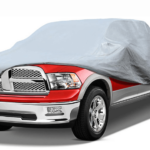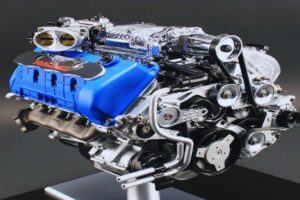Are you in need of a car, but your budget is limited that you cannot afford to buy a brand new one? If so, then you may want to consider buying a loaner car. What is a loaner car?
Many dealerships, garages, and body shops offer loaner cars to their customers. This way, their customers will still have a car they can use while their car is being worked on. Vehicle repair establishments will usually offer loaners if the customer does not have another vehicle. The same is true if the repairs on their car can take a while to finish.
Can you buy a loaner car? Yes, some shops and dealers will sell their loaner cars.
Should you buy a loaner car? Buying a loaner car can be a good decision as they have lower price tags than new cars. Many dealers will also offer factory rebates and zero-percent financing for loaner cars. However, it is important to ensure the loaner car is in good condition and won’t have many issues after buying it.
Read on to learn more about loaner cars and if it is a good idea to buy one.
What Is a Loaner Car?

Have you recently taken your car to the dealership or mechanic for repairs, and they told you that it might take a while to finish? Then they may offer you the use of one of their loaner cars at no extra cost. They would usually only need proof of insurance.
There are even instances when they no longer require it, particularly if you are a regular and good-paying customer. This way, you would still have a vehicle to use while yours is still being worked on.
Sometimes, though, offering a loaner car is not just about goodwill. For instance, a car dealership may provide you with a loaner car that is newer and better than the one you already own. This is so they can entice you to buy a new car instead of sticking with your old one.
Demo, Program, and Loaner Cars
As mentioned, loaner cars are courtesy vehicles provided to customers for use while their actual car is in the service bay. You should not confuse them with demo and program cars.
Demo cars are those that the dealerships use to provide test drives to potential customers. Often, dealership owners also use the demo cars to commute to and from work. However, note that even with that, they only usually rack around 3,000 miles before sending them to the used car lot.
On the other hand, program cars are the ones used by representatives of car manufacturers to drive to the different dealerships to showcase. The manufacturer will then sell them off through distributors once they reach around 10,000 miles on the odometer.
Just like loaner cars, dealerships do not usually register demo and program cars. With that said, you can still consider them as new cars. They are still new even if they already racked up a significant number of miles.
Benefits of Buying a Loaner Car
Many people mistakenly think that loaner cars are not as good as regular secondhand cars. However, this is not usually the case. You can actually enjoy several benefits from buying loaner cars, including the following:
1. Affordable Price
Loaner cars are technically used cars. With that, expect them to be much cheaper than brand new cars with zero mileage on them. Also, since no one purchased the car (if it comes from a dealership), it is still viable for new car financing. These include zero-interest payments.
You can sometimes get as much as $1000 off the sticker price. In most cases, this depends on how many miles it collected on the odometer. In addition, you can still get some additional options installed for free if you play your cards right.
2. Often in Great Condition
Loaner cars are usually not driven long distances. The reason is that customers have to return them after just a couple of hours or days. Also, car dealerships usually set a mileage limit on loaner cars. This limit is usually 1,000 to 5,000 miles before they send it over to their used car lots.
Many loaner cars would still have plastic covering the rear seats. The stickers on the chrome accents are also still on them.
Apart from that, garages and dealerships take excellent care of their loaner cars. It is because such often reflects on their reputations. Furthermore, dealerships would have their loaners detailed between users. That said, you will notice that even the interior will look and feel brand new.
3. Relatively New and Popular Models
Some car dealerships use loaner cars to convince customers to upgrade to a newer model. It is the reason why you can rarely see loaner cars used for more than a year. Also, they tend to use the higher-end models as they provide more features than the base models. This makes it more enticing for the potential buyer. It is a great opportunity to get a newer model car for a significantly lower price.
Disadvantages of Buying Loaner Cars

Are there also drawbacks to buying loaner cars? The answer is yes. Here are just a few of the recognized downsides of loaner cars:
Insurance Companies May Not Value It as Brand New
Although technically loaner cars are new, they might have a couple of hundred or even thousands of miles on the odometer as they have not been registered yet. It is why most insurance companies would value loaner cars as secondhand.
This is true, even though there was no original owner. It also means you will be paying higher premiums. Some insurance companies may not even pay the full cost of replacing the car if it gets wrecked.
Varying Mileage and Wear
Don’t assume that all loaner cars are well taken care of and have low mileage. It will still depend on the dealership or garage you will be buying it from. Many dealerships take good care of their loaners, while others do not give nearly as much.
You need to be careful when inspecting loaner cars for sale. Avoid assuming that they are in good condition. Many dealerships know how to hide imperfections and mechanical problems temporarily. With that in mind, you have to be on your toes all the time. It is because the damage may surface again later after you paid for the car.
Loaner Cars vs Rental Cars
Customers Usually Abuse Rental Cars
When choosing between loaner and rental cars for sale, you should gravitate more towards the loaner. Rental cars are notorious for receiving a lot of abuse from customers, especially those who availed of the optional insurance coverage. This is not to say that all rental car customers are bad drivers. However, they are not inclined to take care of the car at all.
Rental Car Has a Very High Mileage
Another disadvantage of buying a rental is that they often have very high mileage. Many people get rental cars when they need to drive long distances, but they don’t want to use their cars. Some rental cars for sale can have up to 40,000 miles registered on them, and those are hard-driven miles, as customers are not inclined to take care of them.
Rental Cars Have a Low Resale Value
Also, rental cars have very low resale values. This will not matter to you much if you are planning on driving the car to the ground. However, if you want to resell it later to get a new car, you will not get that much out of the sale.
Rentals Have Little, If Any Warranty Left
Rentals also have little, if any, warranty left. Manufacturer warranties are usually for 36,000 miles or three years, whichever comes first. As for the powertrain warranties, they usually cover five years and/or 60,000 miles. Since most rentals already have high mileage, you have to pay for any repairs outside the warranty framework.
You can choose to have an extended warranty. But that will be quite expensive and sometimes quite complicated. In short, you should avoid rental cars if possible. Although you can get lucky with some, you will likely be buying a money pit of a car that will make you spend more on repairs.
Buying a loaner car – is it possible? Yes, some shops and dealers will sell their loaner cars.
Should you buy a loaner car? Buying a loaner car can be a good decision as they have lower price tags than new cars. Many dealers will also offer factory rebates and zero-percent financing for loaner cars. However, it is important to ensure the loaner car is in good condition and won’t have many issues after buying it.
Tips for Buying a Loaner Car

Now that you know the merits and disadvantages of buying a loaner car, you may want to start shopping around for one. Perhaps you already have a particular model that you previously drove, and you want something like it. If so, here is what you need to do:
1. Visit the Dealership’s Website
Go to the dealership’s website to get their email or telephone number. Contact them if they have loaner cars currently for sale. It will save you a lot of time and energy instead of going there only to find that there are no loaners available.
If there are loaner cars available, ask the dealership representative to send you a list of available vehicles. Once you chose a vehicle you are interested in, arrange for a test drive appointment. The dealership may need to arrange for the vehicle to be in their lot, so you need to set an appointment.
2. Inspect for Damages
When the loaner vehicle is already in the dealership, closely inspect it for any damages. Once it is time to take the car for a test drive, turn off the radio to hear if any suspicious noises are coming from the car, listen for any unusual noises coming from the engine. Rev it up to see if there are any problems with the throttle.
Also, drive it over light bumps and shallow potholes. You should then listen to any rattling noises coming from underneath the car. Any noise can be a potentially expensive repair later, so listen very carefully.
After the test drive and parking the vehicle in the dealership lot, closely inspect it inside and out. Check the door panels and dashboard for any broken pieces. Check underneath the carpeting for rust. Note that it is a sign that the car may have been flooded). Check the body for any signs of impact repairs as well.
If possible, arrange for a trusted mechanic to come with you on your test drive. That way, there will be a professional around to help you inspect the car.
3. Ask About the Actual Selling Price
Once you decided that you will be buying the loaner car, ask the dealership to see the actual selling price of a brand-new car. This will help you determine if you are getting a good deal. Do your research on this ahead of time. This is important not just because you should not trust the dealership but also to find out what other dealerships are selling the cars for.
You then need to discuss pricing and discounts. In general, you can ask for as much as 15 cents per mile over 500 miles on the odometer. This is a fair price to ask for a used car. If the odometer reading is around 5,000 miles, then it means you can ask for $675 off the MSRP.
Aside from the discount, ask the representative for any other benefits they could offer on a new car purchase. An unregistered car is new. With that in mind, you can have new car benefits. There might be additional discounts, complete warranties, and maybe even free additional options.
4. Fill Out Financing Application or Visit the Bank
Once you and the dealership agreed on the pricing, fill out the financing application – that is, if you go with in-house financing. Also, visit the bank to get a bank check if you pay for the car in full.
Set an appointment for you and the dealership to deal with the paperwork and have ownership of the vehicle transferred to you. If everything goes smoothly, you can take the car home on the same day. The dealership will also mail the new title and registration by the following week or so.
After taking ownership of the car, let a mechanic check it right away. This is necessary to determine if there is anything that needs repairs.
Conclusion – Loaner Car
Loaner cars are courtesy vehicles offered by dealerships, garages, and paint & body shops to their customers. They can use these cars while theirs are in the service bay. Dealerships usually only offer them to preferred customers.
However, if the dealership knows that you do not have any other vehicle to use and you have good insurance coverage, they would allow a courtesy vehicle until yours is repaired.
When you have the opportunity to buy a loaner car, you should grab it while you can. There are many benefits of getting a courtesy vehicle and very little to no disadvantages. This is the chance for you to get a well-maintained used car and is still technically new for a very affordable price.
Related reading:
Motor Vehicle Service Notification – Is It a Scam?
eBay Motors Scam [What Are They and How to Avoid]


![Clearance Tires at Walmart [How Much Are They? Buying Guide] clearance tires at walmart](https://roadsumo.com/wp-content/uploads/2022/04/clearance-tires-at-Walmart-150x150.jpg)

![How Does Vroom Work? [Buying and Selling] how does vroom work](https://roadsumo.com/wp-content/uploads/2022/04/how-does-Vroom-work-150x150.jpg)




